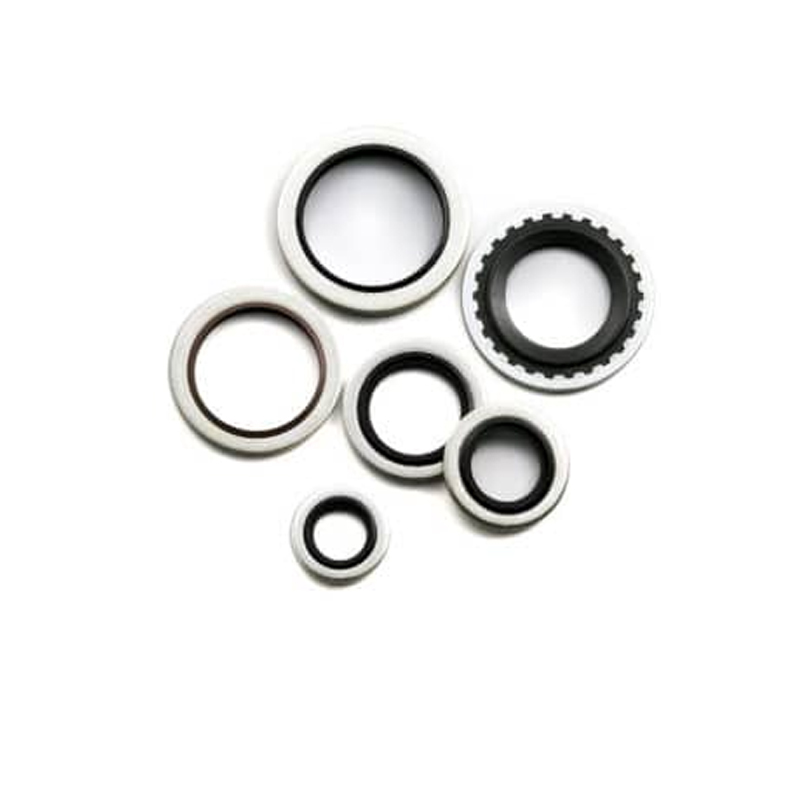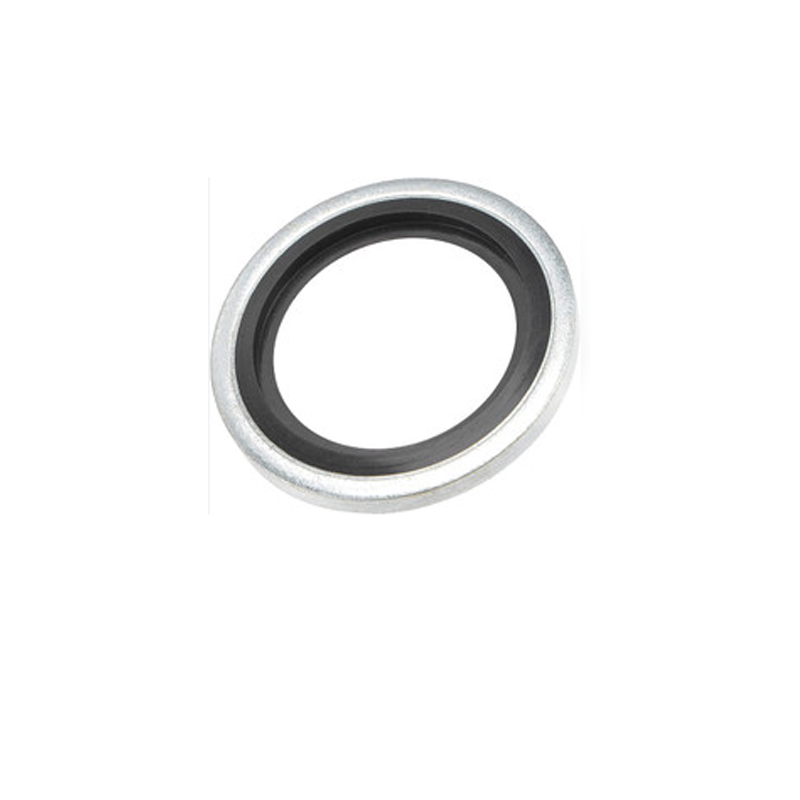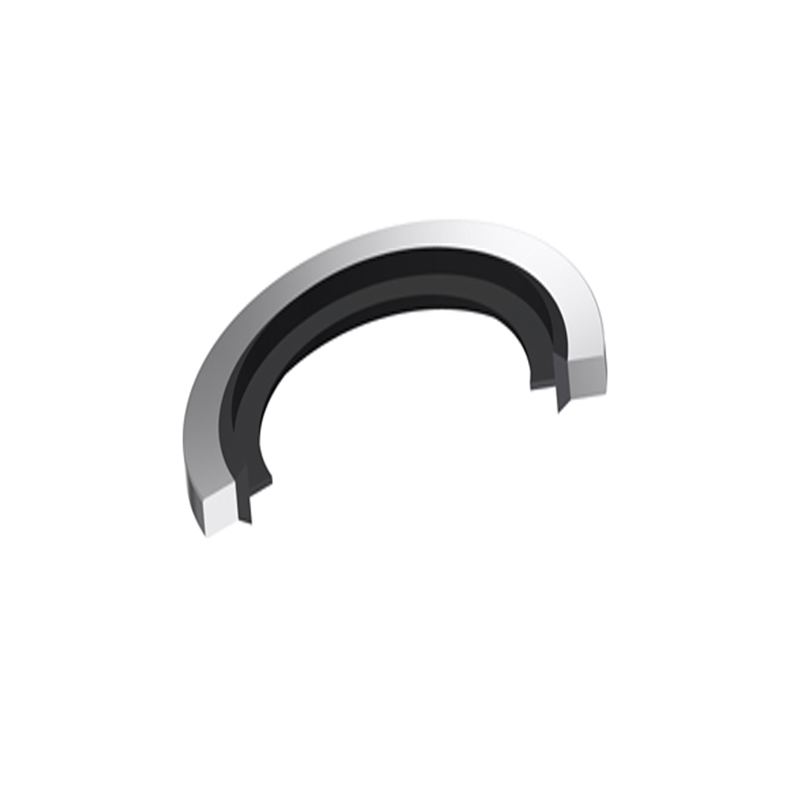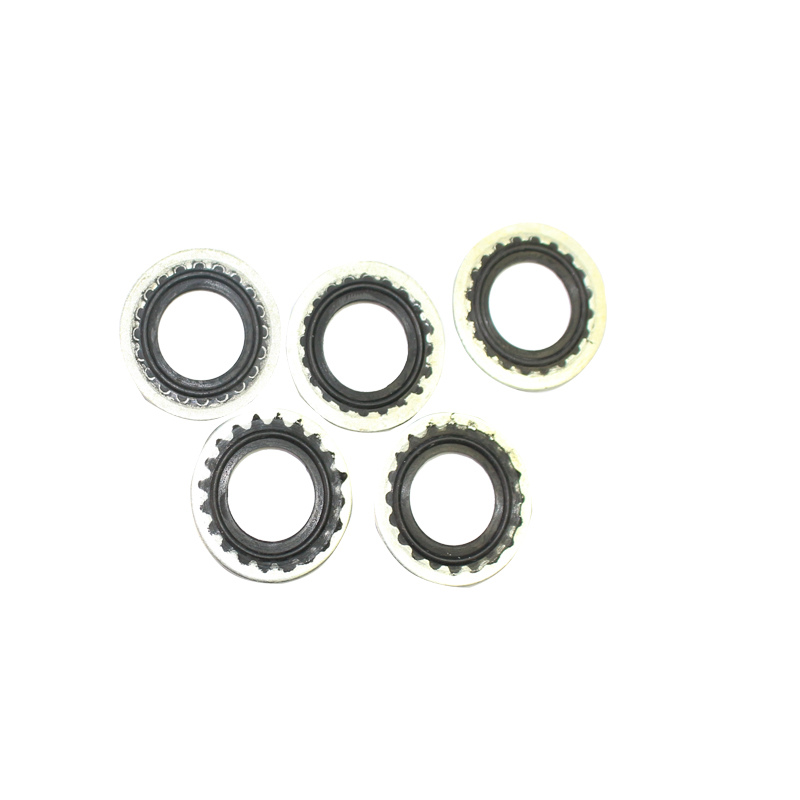Durable Bonded Seal Kits | Prevent Leaks, Enhance Performance
Industry Trends and the Evolution of Sealing Technologies
In the rapidly evolving landscape of industrial engineering, the demand for robust, reliable, and efficient sealing solutions has never been more critical. Industries ranging from automotive and aerospace to petrochemical and heavy machinery are consistently pushing the boundaries of operational parameters, necessitating advanced components that can withstand extreme pressures, temperatures, and corrosive environments. This drives continuous innovation in seal design and materials.
A prime example of such innovation is the bonded seal kit, also widely known as a Dowty seal. These composite sealing washers have emerged as a superior alternative to traditional sealing methods, offering enhanced performance and simplified assembly. The global market for industrial seals is projected to grow significantly, with a CAGR estimated at around 4-5% through 2028, driven by increasing industrial automation, stringent environmental regulations requiring leak-free systems, and a focus on operational efficiency and reduced maintenance costs. The versatility and reliability of solutions like the bonded seal position them at the forefront of this growth, particularly in hydraulic and pneumatic systems where consistent sealing integrity is paramount.
Modern trends emphasize sustainability and longevity. Engineers are increasingly seeking seals that not only perform exceptionally but also reduce material waste and contribute to energy efficiency by preventing fluid loss and maintaining system pressure. The integration of advanced elastomers with high-strength metals addresses these requirements, ensuring that today's sealing solutions are future-proof.
Understanding the Bonded Seal Kit: Structure and Functionality
A bonded seal kit is an innovative sealing component consisting of a metal washer and an elastomeric ring, which are permanently bonded together. This design creates a robust, self-centralizing seal that prevents leakage of fluids or gases under high pressure. The metal washer, typically made from carbon steel, stainless steel, or aluminum, provides structural integrity and limits compression, while the elastomeric ring, often NBR, FKM, EPDM, or Silicone, provides the primary sealing action. When compressed, the lip of the elastomeric ring creates an effective barrier against leaks.
Key variations include the bonded piston seal, designed for dynamic applications within hydraulic cylinders, and the bonded seal ring, often used in static applications for flange or port sealing. The inherent advantages of this composite design include superior resistance to extrusion, simplified assembly compared to traditional O-rings with backup washers, and excellent performance across a broad range of temperatures and pressures. This makes them ideal for critical sealing points where reliability cannot be compromised, effectively creating a metal bonded seal that withstands demanding operational conditions.

Manufacturing Process Flow of a Bonded Seal Kit
The production of a high-quality bonded seal kit involves a precise, multi-stage manufacturing process, ensuring optimal performance and durability. Each step is meticulously controlled to meet stringent industry standards.
1. Material Selection and Preparation
- Metal Washer: Typically, carbon steel (zinc or chrome plated for corrosion resistance), stainless steel (304, 316), or aluminum is selected based on application requirements (e.g., pressure, fluid compatibility, temperature). Raw material coils or sheets undergo initial inspection for quality.
- Elastomer: Common materials include Nitrile Butadiene Rubber (NBR) for general hydraulic fluids, Fluorocarbon Rubber (FKM/Viton) for high-temperature and chemical resistance, Ethylene Propylene Diene Monomer (EPDM) for water, steam, and some chemicals, and Silicone for extreme temperatures. These are compounded to specific durometer hardness and chemical resistance properties.
2. Metal Washer Manufacturing
- Stamping/Pressing: Metal sheets are fed into high-precision presses where specialized tooling cuts and forms the washers to exact dimensions. This process ensures consistent outer and inner diameters.
- Deburring & Cleaning: Edges are deburred to remove sharp points, and washers are thoroughly cleaned to ensure a pristine surface for optimal elastomer bonding. This step is critical for preventing stress concentrations and ensuring bond integrity.
- Surface Treatment: For carbon steel washers, processes like zinc plating or chromate conversion are applied to enhance corrosion resistance, crucial for extending service life in harsh environments.
3. Elastomer Molding and Bonding
- Adhesive Application: A specialized bonding agent is applied to the clean metal washers. This adhesive is crucial for creating a permanent, high-strength bond between the metal and elastomer during the molding process.
- Compression or Injection Molding: The prepared metal washers are placed into precision molds. The elastomer compound is then either compressed or injected into the mold cavity, where it flows around the washer and cures under heat and pressure. The bonding agent reacts with both the metal and the rubber, forming an inseparable unit.
- Curing: The molding process includes a specific curing time and temperature, which are critical for achieving the desired physical properties of the elastomer and ensuring a strong bond.
4. Finishing and Quality Control
- Deflashing: Excess rubber material (flash) is carefully removed from the finished seals.
- Post-Curing (if required): Certain elastomers, especially FKM, may undergo a post-curing process to enhance their long-term stability and mechanical properties.
- Inspection & Testing: Each metal bonded seal undergoes rigorous quality checks. This includes visual inspection for defects, dimensional checks (e.g., using optical comparators or automated measurement systems), and functional tests such as pressure testing to ensure integrity under specified conditions. Destructive bond strength testing is also performed on samples. Compliance with standards like ISO 3601 (Fluid power systems - O-rings), ISO 6917 (Elastomeric seals for hydraulic cylinders - Dimensions and tolerances), and ASTM D2000 (Standard Classification System for Rubber Products in Automotive Applications) is verified.
This detailed process ensures that each bonded seal kit delivers superior sealing performance, an extended service life of typically 5-10 years under normal operating conditions (dependent on material and application stress), and robust advantages such as enhanced energy saving by preventing fluid loss, and superior corrosion resistance when appropriate materials and platings are chosen for specific target industries like petrochemical, metallurgy, and water supply & drainage.

Technical Specifications and Performance Parameters
The effectiveness of a bonded seal kit is defined by its ability to perform under specific operational parameters. Understanding these technical specifications is crucial for selecting the correct seal for any given application. These parameters ensure optimal system integrity and longevity.
| Parameter | Typical Range/Value | Notes & Material Specifics |
|---|---|---|
| Pressure Rating | Up to 70 MPa (700 bar / 10,000 psi) | Dependent on material hardness and housing design. High-pressure applications benefit from robust metal washers. |
| Temperature Range (NBR) | -30°C to +100°C (-22°F to +212°F) | Excellent for general-purpose hydraulics. |
| Temperature Range (FKM) | -20°C to +200°C (-4°F to +392°F) | Ideal for high-temperature applications and aggressive chemicals. |
| Temperature Range (EPDM) | -40°C to +150°C (-40°F to +302°F) | Suitable for water, steam, and polar solvents. Not for petroleum-based fluids. |
| Hardness (Elastomer) | 70 to 90 Shore A | Higher hardness for greater pressure resistance, but less flexibility. |
| Fluid Compatibility | Hydraulic oils, water, fuels, coolants, acids, bases | Specific elastomer choice is critical for chemical resistance. |
| Metal Washer Material | Carbon Steel (plated), Stainless Steel (304, 316), Aluminum | Chosen for strength, corrosion resistance, and compatibility with the application. |
| Standard Sizes | From M5 to M60 (metric), or 1/8" to 2" (imperial) | Conform to industry standards like ISO 1179, DIN 3852, BSP. |
These parameters underscore the versatility and robust engineering behind each bonded seal kit. Precision in manufacturing and material selection ensures optimal performance, enhancing system reliability and reducing the total cost of ownership through minimized leakage and maintenance.

Key Technical Advantages
The engineering design of a bonded seal kit delivers several distinct advantages over traditional sealing components, making it a preferred choice for demanding industrial applications:
- Superior High-Pressure Sealing: The robust metal outer ring prevents the extrusion of the elastomeric sealing element, enabling the bonded seal to withstand significantly higher pressures than standard O-rings, often exceeding 70 MPa (10,000 psi). This is critical for high-performance hydraulic and pneumatic systems.
- Enhanced Anti-Extrusion Properties: The rigid metal washer provides inherent anti-extrusion capabilities, ensuring the elastomer remains confined even under peak pressure loads, thereby preventing seal failure and extending operational life.
- Simplified Assembly and Reduced Risk of Error: As a single, integrated unit, the bonded seal kit eliminates the need for separate washers and O-rings, streamlining assembly processes. This reduces the risk of incorrect installation and ensures consistent performance across manufacturing batches.
- Reduced Flange Damage: The metal outer ring distributes the clamping force evenly, protecting soft components (like aluminum flanges) from damage during over-tightening, a common issue with non-bonded seals.
- Cost-Effectiveness and Reusability: While the initial unit cost might be slightly higher than a basic O-ring, the long service life, reduced downtime due to leakage, and in some cases, reusability of the metal component make bonded piston seals highly cost-effective over their lifecycle.
- Broad Material Compatibility: With a wide range of elastomer and metal combinations available, these seals can be precisely tailored to provide excellent chemical resistance to various fluids and gases, and operate effectively across extreme temperature spectrums.
- Corrosion Resistance and Durability: Depending on the metal plating (e.g., zinc-plated carbon steel, stainless steel) and elastomer type, the seals offer excellent resistance to corrosion, ensuring durability and reliability even in challenging environmental conditions, enhancing the overall system lifespan.

Application Scenarios and Target Industries
The robust design and versatile material options of bonded seal kits make them indispensable across a multitude of industrial sectors. Their ability to deliver leak-free performance under extreme conditions is a critical factor in their widespread adoption.
- Petrochemical and Oil & Gas: In environments characterized by corrosive chemicals, high pressures, and fluctuating temperatures, metal bonded seals are used extensively in valves, pumps, pipe connections, and hydraulic control systems. Their FKM versions provide exceptional resistance to hydrocarbons and aggressive processing fluids, preventing costly leaks and ensuring safety.
- Heavy Machinery and Construction: Hydraulic and pneumatic systems in excavators, loaders, agricultural equipment, and mining machinery rely on bonded piston seals for dependable sealing of ports and fittings. The robust nature of these seals withstands shock, vibration, and debris, crucial for prolonging equipment lifespan and minimizing downtime in arduous conditions.
- Water Supply & Drainage Systems: For applications involving potable water, wastewater treatment, and irrigation, EPDM bonded seals offer excellent resistance to water, steam, and ozone without contaminating the fluid. They are integral in sealing flanges, pipe joints, and various control valves, ensuring long-term system integrity and preventing environmental contamination.
- Automotive and Transportation: Found in braking systems, fuel injection systems, power steering units, and air conditioning systems, these seals provide reliable, leak-proof connections. They withstand vibration, temperature cycling, and exposure to various automotive fluids, contributing to vehicle safety and performance.
- Aerospace: Critical for aircraft hydraulic systems, landing gear, and engine components, where extreme conditions demand seals with exceptional reliability, lightweight properties (e.g., aluminum washers), and resistance to specialized aerospace fluids.
- Manufacturing and Industrial Automation: Used in robotics, machine tools, and process control equipment, ensuring precision and reliability in pneumatic and hydraulic actuators, manifold blocks, and other fluid power components.
These diverse applications underscore the versatility of a bonded seal kit. By preventing leaks, they contribute significantly to energy saving through maintaining system pressure and fluid integrity, and their material versatility ensures superior corrosion resistance where needed, ultimately enhancing operational efficiency and safety across industries.

Vendor Comparison and Selection Criteria
Choosing the right supplier for a bonded seal kit is paramount to ensuring consistent quality, performance, and long-term reliability in industrial applications. While many manufacturers offer bonded seals, significant differences exist in their capabilities, quality control, and customer service. Here's a comparative overview of common vendor types and key selection criteria:
Vendor Comparison Table:
| Feature/Criterion | Specialized Manufacturer (e.g., YJM Seal) | General Industrial Supplier | Economy/Trader |
|---|---|---|---|
| Product Quality & Consistency | High, stringent QC, proprietary processes, certified materials. | Good, generally adheres to standards, may use outsourced components. | Variable, QC can be inconsistent, focus on lowest cost. |
| Technical Expertise & R&D | Deep, in-house R&D, application engineering support, innovation. | Moderate, provides standard solutions, limited R&D input. | Minimal, often resells, little technical support beyond basic specs. |
| Customization Options | Extensive, tailor-made solutions for unique requirements. | Limited to standard modifications of existing products. | Very limited or none, offers off-the-shelf products only. |
| Certifications & Compliance | ISO 9001, API, REACH, RoHS, industry-specific standards. | Typically ISO 9001, basic industry compliance. | May claim compliance, but often lacks independent verification. |
| Lead Time & Logistics | Optimized production, reliable supply chain, global distribution. | Standard lead times, may face delays with non-stock items. | Potentially long, unpredictable, reliance on external sources. |
| After-Sales Support | Comprehensive technical assistance, warranty, problem-solving. | Standard support, may require escalation for complex issues. | Limited, mainly order-based, little to no technical troubleshooting. |
For critical applications where performance and longevity are paramount, partnering with a specialized manufacturer offering deep technical expertise and comprehensive quality assurance is generally the most prudent choice. This ensures that the bonded seal kit integrates seamlessly into demanding systems, minimizing operational risks and maximizing return on investment.

Customized Solutions for Unique Requirements
While standard bonded seal kits cater to a wide array of applications, many B2B clients encounter unique operational challenges that necessitate tailored sealing solutions. Leading manufacturers provide extensive customization options to precisely match specific performance criteria, ensuring optimal integration and prolonged service life.
Key Customization Capabilities Include:
- Material Selection Optimization: Beyond standard NBR, FKM, and EPDM, specialized elastomers (e.g., HNBR for high-temperature oil resistance, Silicone for extreme low/high temperatures and medical applications, FFKM for ultimate chemical resistance) can be bonded. Metal washers can be custom-fabricated from exotic alloys like Hastelloy or Inconel for extreme corrosion resistance or specific structural demands.
- Custom Dimensions and Profiles: Manufacturers can produce seals with non-standard inner diameters, outer diameters, and cross-sections to fit unique port designs or limited space envelopes. This includes specialized elastomer profiles to optimize sealing force or minimize friction.
- Specific Plating and Coatings: Metal washers can receive custom platings such as nickel, cadmium-free zinc-nickel, or phosphate coatings to enhance corrosion resistance, electrical conductivity, or provide aesthetic finishes suitable for particular environments.
- Integrated Features: Custom designs may incorporate features like anti-rotation tabs, specific lead-in chamfers, or unique fastening mechanisms directly into the washer design for simplified installation and improved functionality within complex assemblies.
- Small-Batch and High-Volume Production: Custom solutions can be scaled from prototyping and small-batch production for specialized machinery to high-volume manufacturing for OEM integration, maintaining consistency and cost-effectiveness across all production scales.
Engaging with a manufacturer capable of providing these tailored solutions ensures that the metal bonded seal perfectly addresses the precise technical, environmental, and regulatory demands of any project, optimizing system performance and extending maintenance cycles.
Application Case Studies: Real-World Performance
The proven track record of bonded seal kits in challenging industrial environments demonstrates their reliability and efficacy. Here are illustrative examples of their successful implementation:
Case Study 1: High-Pressure Hydraulic System for Offshore Drilling Rigs
- Challenge: An offshore drilling company faced frequent leakage issues in their hydraulic power units operating at pressures up to 60 MPa (8,700 psi). Traditional O-rings and backup rings failed due to extrusion and degradation from hydraulic fluids and seawater corrosion, leading to costly downtime and environmental concerns.
- Solution: Custom bonded seal kits with stainless steel 316 washers and FKM (Viton) elastomers were specified for all critical hydraulic ports. The FKM provided superior chemical resistance to the synthetic hydraulic fluids and seawater, while the stainless steel offered excellent corrosion resistance.
- Outcome: The implementation resulted in a 95% reduction in hydraulic fluid leaks from connection points within the first year. The enhanced anti-extrusion properties of the metal bonded seal significantly extended maintenance intervals, reducing operational costs by an estimated 30% annually and improving environmental compliance.
Case Study 2: Chemical Processing Plant's Aggressive Fluid Transport
- Challenge: A facility processing strong acids and alkalis at elevated temperatures required a robust seal for their pipe flange connections and valve bodies. Existing PTFE seals exhibited cold flow, causing relaxation and subsequent leakage over time.
- Solution: Specialized bonded seal kits featuring Hastelloy C276 washers and custom-compounded perfluoroelastomer (FFKM) were deployed. This combination offered unparalleled chemical resistance and maintained integrity under sustained temperatures up to 260°C.
- Outcome: The new seals entirely eliminated leakage incidents at the critical connection points, improving worker safety and preventing environmental contamination. The extended service life of the seals reduced replacement frequency by over 80%, leading to significant savings in maintenance labor and material costs.
Case Study 3: Automotive Braking System Reliability Upgrade
- Challenge: An automotive OEM sought to improve the reliability of their heavy-duty vehicle braking systems, which experienced occasional fluid seepage around hydraulic line connections under severe vibration and pressure cycling.
- Solution: Standard NBR 70 Shore A bonded seal kits with zinc-plated carbon steel washers were adopted as the standard for all hydraulic brake line fittings. The integrated design ensured consistent compression and reduced installation torque variations.
- Outcome: Field data confirmed a dramatic reduction in warranty claims related to brake fluid leaks, enhancing vehicle safety and brand reputation. The simplified installation process also reduced assembly line time by 15%, contributing to overall manufacturing efficiency.

Quality Assurance and Authoritative Certifications
Ensuring the highest level of quality and reliability in industrial components is non-negotiable. For a bonded seal kit, adherence to international standards and robust quality management systems is critical. Reputable manufacturers demonstrate their commitment through comprehensive certifications and rigorous testing protocols.
Key Certifications and Standards:
- ISO 9001:2015 Certification: This internationally recognized standard for quality management systems ensures consistent product quality and continuous improvement across all manufacturing processes, from raw material sourcing to final inspection.
- Material Compliance (REACH, RoHS): Adherence to environmental regulations like REACH (Registration, Evaluation, Authorisation and Restriction of Chemicals) and RoHS (Restriction of Hazardous Substances) ensures that materials used are safe and environmentally responsible, critical for global distribution.
- ASTM D2000: This standard classification system for rubber products helps specify elastomer characteristics, ensuring predictable performance based on material grades.
- Industry-Specific Standards: For sectors like oil & gas, compliance with API (American Petroleum Institute) standards is often required. For food-grade or medical applications, FDA or USP Class VI compliance for specific elastomers is essential.
- In-house Testing: Beyond external certifications, advanced manufacturers conduct extensive internal testing, including pressure testing, temperature cycling, chemical compatibility tests, and destructive bond strength analysis, to ensure every bonded seal kit meets or exceeds performance expectations.
Through decades of specialized experience and strategic partnerships with industry leaders, manufacturers consistently deliver products that not only meet but often surpass the stringent requirements of their global clientele, solidifying their reputation for authoritativeness and trust.
Trustworthiness: FAQ, Lead Time, Warranty, and Support
Building lasting relationships in the B2B sector relies heavily on transparency, clear commitments, and dependable support. This section addresses common inquiries and outlines the framework for customer satisfaction.
Frequently Asked Questions (FAQ)
- Q: How do I select the correct bonded seal kit for my application?
A: Selection depends on critical factors: operating pressure, temperature range, chemical compatibility with the fluid, and the physical dimensions of the sealing groove/port. Our technical sales team can assist with material and size recommendations based on your specific requirements.
- Q: Can these seals be reused?
A: While the metal washer component is often reusable, the elastomeric element can be subject to permanent deformation after initial compression, which may compromise its sealing integrity upon reinstallation. For critical, high-pressure, or hazardous applications, replacement is strongly recommended to ensure optimal performance and safety.
- Q: What are the installation best practices?
A: Ensure mating surfaces are clean, free of burrs, and correctly machined. The seal should be placed centrally over the bolt or pipe connection. Tighten fasteners evenly to the recommended torque specifications to achieve proper compression without over-tightening, which can damage the seal or flange.
Lead Time and Fulfillment
Standard catalog items are typically shipped within 2-5 business days, depending on stock availability and order volume. For customized bonded seal kits or large-volume orders, lead times will be provided upon quotation, typically ranging from 3-6 weeks, allowing for material procurement, manufacturing, and rigorous quality control processes. We maintain a robust global logistics network to ensure timely and efficient delivery.
Warranty Commitments
All our products, including every metal bonded seal, are warranted against defects in material and workmanship for a period of 12 months from the date of shipment, provided they are installed and used in accordance with our specifications and industry best practices. This commitment underscores our confidence in the quality and durability of our sealing solutions.
Comprehensive Customer Support
Our dedicated customer support team and technical engineers are available to provide expert guidance on product selection, application engineering, installation advice, and troubleshooting. We offer direct phone and email support, as well as on-site technical assistance for complex projects. Our goal is to ensure seamless integration and optimal performance of our products within your systems.

Conclusion
The bonded seal kit represents a pinnacle in modern industrial sealing technology, offering a robust, reliable, and highly efficient solution for myriad demanding applications. Its composite design, combining the structural integrity of a metal washer with the sealing resilience of an elastomer, addresses critical challenges associated with high-pressure, high-temperature, and chemically aggressive environments. From ensuring the integrity of hydraulic systems in heavy machinery to preventing leaks in complex petrochemical processes, these seals are instrumental in enhancing operational safety, efficiency, and longevity across key industrial sectors.
As industries continue to advance, the demand for sophisticated sealing components will only intensify. With capabilities for extensive customization, adherence to rigorous international quality standards, and comprehensive customer support, leading manufacturers are well-positioned to provide the precision-engineered bonded seal kit solutions essential for the critical applications of today and tomorrow. Investing in high-quality bonded seals is not merely a purchase; it is a strategic decision towards operational excellence and long-term asset protection.
References
- International Organization for Standardization. (2019). ISO 9001:2015 - Quality management systems - Requirements.
- ASTM International. (2020). ASTM D2000 - Standard Classification System for Rubber Products in Automotive Applications.
- European Chemicals Agency. (2023). REACH – Registration, Evaluation, Authorisation and Restriction of Chemicals.
- Hydraulic Pneumatic & General Engineering Journal. (2022). Advances in High-Pressure Sealing Solutions. Vol. 45, No. 3, pp. 88-95.
- Machinery Lubrication Magazine. (2021). The Critical Role of Seals in Preventing Fluid Contamination and Leakage. Issue 12, pp. 24-29.
-
Seal 12x20x5: Precision Radial Shaft Seals for Industrial Reliability
News Nov.24,2025
-
Seal 12x18x5: Essential Guide to Specifications, Applications & Vendors
News Nov.24,2025
-
Understanding Seal 12 20 5: Applications, Specifications & Industry Insights
News Nov.23,2025
-
Durable Oil Seal 85x110x12 – Reliable Sealing Solutions for Industry
News Nov.23,2025
-
Durable and Precise Oil Seal 75x95x10 for Efficient Machinery | YJM Seal
News Nov.22,2025
-
Durable Oil Seal 75x100x10 for Reliable Industrial Performance | YJM Seal
News Nov.22,2025
-
High-Quality Oil Seal 65x90x10 | Durable & Reliable Sealing Solutions
News Nov.22,2025
Products categories















